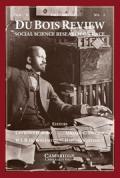
Generating new understandings of the contributions of W. E. B. Du Bois’s The Philadelphia Negro (1899) for sociology and social science more generally, this article posits that the urban analysis provided in the book demonstrates how interwoven cultural and economic factors undergird the social organization of urban communities more so than any pragmatic economic pattern or logic. It is the interwoven nature of these factors (defined in this article as the counterintuitive economic logics of the study) that have been insufficiently acknowledged in recent decades of social scientific urban studies research. Exploring the interwoven nature of cultural and economic factors in the sustenance of Philadelphia’s Black Seventh Ward, this article suggests that the agency of African Americans is a critical, yet undervalued, aspect of their urban living. This article situates W. E. B. Du Bois as the first of some later voices (mostly within urban ethnography) that offer a corrective and alternative to urban spatial conceptual frameworks that did not and do not fully account for the persistent influence of race and the agency of racial minorities on the landscape of American cities.